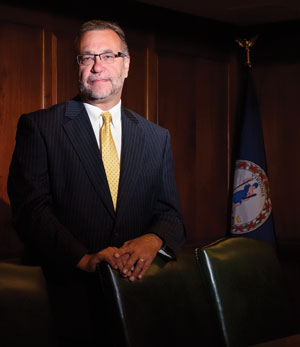How lawyers can turn fear into an ally

Photo Illustration by Stephen Webster
Yoder, a commercial litigator with Wharton Aldhizer & Weaver in Harrisonburg, Virginia, was defending a rural North Carolina grocery store in a slip-and-fall case and was up against an experienced plaintiffs attorney. A woman sued the store after slipping on a grape in the produce section and injuring her back. She claimed the store was negligent since she didn’t see the grape because she was distracted by a promotional display of fatback, a cut of pork popular in Southern cooking.
As a young lawyer then, Yoder not only had the jitters—he wanted to make a good impression and make sure he had control of his case. “So I just prepared, prepared, prepared,” he says. “I think there’s more fear of the unknown than anything else.”
By the time the trial came around, Yoder knew his case backward and forward, and he worked to channel his nervous energy into his jury presentation. “Once I started doing it, the fear went away and there was this edge,” he says. “It actually became fun.”
On top of winning the case, Yoder learned how to lasso fear into an ally.
STRESS TEST
Experiencing anxiety before going to trial is not uncommon. The challenge for many lawyers is taking that nervous energy and using it to their advantage.
Yet lawyers often are imprisoned by fear. They’re fearful that their cases are out of control. They’re fearful of looking foolish. They’re fearful of negotiating. They’re fearful of appearing weak. Even continuing legal education courses can contribute by making lawyers fear that they are not up to date on current practices or wary of the myriad number of things that can go wrong.
(Is one of your fears among the most daunting? See “Lawyers’ Top Fears.”)
Being fearful is not always bad, as Yoder found out. Lawyers need to manage and embrace their fears rather than succumb to their de-structive powers, says John Lande, a professor emeritus at the University of Missouri School of Law. Lawyers’ fears, he says, can lead them to enhance their performance with increased preparation and skills for thinking effectively on their feet.
Lande examined fears endemic to the legal profession in a 2014 article, “Escaping from Lawyers’ Prison of Fear,” published in the University of Missouri-Kansas City Law Review.

Marshall Yoder. Photograph by David Hills
Fear has become part of the legal culture because lawyers, like soldiers, often feel engaged in battle. “There is a sense of being in adversarial combat,” Lande says. “You’re dealing with an enemy that’s shooting back and you have to anticipate their moves and strategies.”
“We just move in an atmosphere of fear. It’s intrinsic to the profession,” says Bill Rotts, a plaintiffs lawyer in Columbia, Missouri. “We’re fearful for our clients and fearful of making a boneheaded decision. We’re fearful for our reputation. We’re in a constant fear environment.”
Rotts, a former prosecutor as well as a mountain and wilderness guide, says fears stem from how lawyers view themselves, and whether they feel they’re firmly in control of their clients and cases or are trying too hard to please. “There’s that fear that you won’t do a good job. You worry about burying yourself in a mess,” he says. “There are fears that haunt you in every case—of them going out of control and letting things collapse.”
Though Rotts has argued hundreds of cases before juries and appeared in courthouses across the state, including the Missouri Supreme Court, he became the most fearful he’d ever been when he was called to argue a case in the 8th U.S. Circuit Court of Appeals. He was representing a group of clients who claimed they were victims of racial profiling at a Dillard’s department store.
Rotts remembers his fears coming from many sources. He wanted badly to win for his clients in what he considered an important civil rights case. He felt pressure arguing against seasoned lawyers. He also felt intimidated by the grandeur of the Thomas F. Eagleton courthouse in St. Louis, the largest federal courthouse in the country and home of the 8th Circuit. In the shadow of the courthouse was the Old Courthouse, where the famous Dred Scott case over slave rights was argued.
“Here I am from a small law firm trying to push an enormous constitutional question,” Rotts says. “It was in the most impressive courtroom you can ever imagine. The judges surround you like a horseshoe. You can’t imagine how intimidated I was to be there.”
Rotts asked himself: “What do you do? How do you get over it?”
He decided to surround himself with the people closest to him. He asked his law partner to come, as well as his three children, hoping their presence would motivate him in the same way he was motivated to be a good father. “They all dressed up perfectly in their suits and sat right in the front row,” he says. “You live day to day with your kids and you never want them to see you as weak or undecided, but instead confident and in control.”
When it came time to speak Rotts stepped up. “I still had the jitters in the worst way. It was one of the scariest moments in my life,” he says. “I think I made the best presentation in my life and have [my children] to thank.”
Though he lost the appeal, Rotts felt he won something by tackling his fears. “When you’re a plaintiffs attorney, you get used to losing,” he says. “You close the file and you go on.”
DAMAGE ASSESSMENT
While it’s normal to feel anxiety before and during a trial, some attorneys may find their fears all-encompassing.
Early in her career, Seattle attorney Sevilla Rhoads felt anxiety about meeting her clients’ expectations and being as prepared as she could. But she felt that her fears were taking too large a toll on her health and ability to think as effectively as she wanted.
Her fears sometimes led to fatigue and migraine headaches. They triggered stress that affected her physically, making her shoulders tense and filling her body with adrenaline. “It impeded my ability to think as clearly as I knew I could,” says Rhoads, a labor and employment lawyer with Garvey Schubert Barer.
Then about 15 years ago, Rhoads was introduced to stress-reduction techniques and skills and began to rethink how she wanted to practice law and be more mindful about her life and work. “Over time, I realized I could be more effective without being fear-based,” she says.
The fear is compounded because while clients are relying on their lawyers to win, many factors are beyond the attorney’s control. “That responsibility used to cause me anxiety, but now inspires me to manage my stress constructively,” Rhoads says.
Lande says fear is often necessary, and that it helps keep lawyers on their toes. He compares lawyers’ fears to those experienced by soldiers whose heightened state in battle can help them stay alert, cautious and able to respond effectively to threats.
While lawyers are not actually dodging bullets, they do experience the same types of fears as soldiers. They’re categorized into realistic fear, fear of the unknown, anxiety, illogical fear or fear of failure. Lande cites research by military expert Michael Asken, who recommends dealing with such fears through increased training, simulations of frightening situations, setting appropriate goals and going through mental rehearsals.

Photo Illustration by Stephen Webster
Asken suggests that dealing with fear of failure requires accepting the inevitability of making mistakes and appreciating the value of those mistakes as part of learning. He also recommends stress-management techniques, psychological counseling and developing a positive outlook.
But it can be a problem when fear is out of proportion to the actual threats and remains unaddressed. It can lead to obsessive-compulsive disorder, panic attacks, phobias and post-traumatic stress disorder.
Not surprisingly, research suggests that many lawyers’ fears develop during law school, where students may seem outwardly confident but may be masking feelings of inadequacy, uncertainty and nervousness. The stresses of carrying a heavy workload, studying theoretical concepts rather than practical law and getting good grades contribute to their fears.
One of the biggest fears among law students is being humiliated in front of their classmates. “Law schools don’t do a very good job of preparing students to practice,” says Lande, “and part of that involves building confidence.”
LEARNED ATTITUDES
“Law school instills a ‘win at all costs’ mentality rather than a focus on practical client solutions—including the use of collaboration,” Rhoads adds.
Yoder remembers enduring the questions of his professors during Socratic-style exchanges. The experience was not necessarily positive. “Coming out of that makes you hypercritical and hypersensitive,” he says. “You parse everything, and I was like that when I came out.”
There was something else missing in his legal education. “When I went to law school, there were no negotiation classes,” Yoder says. “That was a fear I had … how to negotiate. When you view this with fear, that’s where attorneys go into this default of being argumentative, fearful. When attorneys feel threatened, they go into that mode.”
Lande couldn’t agree more. His study found that lawyers fear negotiating, sometimes to the detriment of their clients. “This is deeply embedded in the legal culture,” Lande says. “There is a generally recognized phenomenon that lawyers are afraid to negotiate, or that if they suggest negotiation that the other side will perceive that as a weakness.”
Lawyers often fear their clients will see them as weak if they suggest negotiating. “Lawyers are caught in the middle. They want to project strength and confidence to their clients and to the other side, but they know very well they might have to negotiate,” Lande says.
Lande suggests lawyers spend more time developing better relationships with opposing counsel, because so much of law depends on negotiation. “One of the tricky things is the appearance that the relationships with their counterparts is too chummy,” Lande notes. “Clients often have the expectation that their lawyers are going to be tough, like the ones they see on TV.”
Rhoads found, as Lande suggests, that building a practice that embraces negotiation helped diminish her fears of using it as a tool to help clients get what they want.
“This approach may be less financially lucrative for lawyers,” Rhoads says. “The traditional adversarial mode is draining on everyone, including the courts, and less effective when you consider your client’s interests rather than your own financial gain.”
Rotts has taken a similar approach, which helps alleviate his fears. “Negotiation is the very essence of the practice. Most of my day is negotiating. I’m the plaintiff, and I’m asking for something,” he says. “We’re not afraid of it. But you also have to be recognized as someone who won’t roll over. Clients want the bulldog. They want someone who’s tough and who’s going to make it right.”
Lande’s study found that even negotiation can induce fear. (See “Negotiation Nerves.”)
When he began practicing, Yoder learned better ways. “I got to see some very seasoned litigators in negotiations,” he says. “What I saw was collegial ways of negotiating. It was firm. It was serious. But they also talked about their wives and kids and what they liked on TV. My takeaway was that effective lawyers were not the people who banged on the table and screamed.”
Yoder tries to not bang tables or operate on fear if an exchange with another lawyer becomes tense. “I still go there and then I catch myself,” he says. “There’s a physiological response—a fight or flight feeling. I take a deep breath. If I feel my breath getting short, I do breathing exercises.”
Breathing can indeed be an effective method of calming down. Yoder says he’s often used a method he read about from best-selling author Dr. Andrew Weil called 4-7-8 breathing. “You breathe in for four seconds, hold for seven and breathe out slowly for a count of eight; and you do this several times,” Yoder says. “If I’m going into a tough negotiation and I know there will be high emotion and intensity, I do this.”
MINDFULLY MANAGED
Rhoads, like many other lawyers, practices the mindfulness techniques of Jon Kabat-Zinn, founding director of the Stress Reduction Clinic at the University of Massachusetts Medical School, and noticed she was more successful in negotiations and litigation. In 2010, she and a group of fellow Washington litigators formed the Washington Contemplative Lawyers, which meets weekly to practice skills to be more effective lawyers and, at the same time, experience a better and healthier quality of life where they are able to be driven by client interests rather than fear.
Lande suggests mindfulness and meditation as ways to address fears, but he also points out that some lawyers are so absorbed by fear that they may need mental health counseling. Those who try to alleviate their fears through drugs or alcohol are candidates for counseling as well.
Even though most lawyers likely feel some kind of anxiety at some point, Lande admits that the title of his study, Escaping from Lawyers’ Prison of Fear, is part hyperbole to make a point. “But some lawyers’ fears unnecessarily prevent them from performing well, producing good results for clients, earning more income and experiencing greater satisfaction in their work,” he writes. “Lawyers who can manage their fears effectively are likely to do better than those who do not manage their fears as well.”
Related article:
ABA Journal: “32 of lawyers’ most common fears”
This article originally appeared in the November 2015 issue of the ABA Journal with this headline: “Lawyers Shackled by Fear, Fear Not: While feelings of dread may be endemic to the legal profession, they can be transformed to positive effect.”



